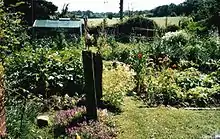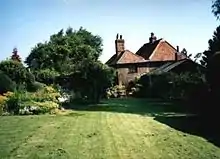Dial House, Essex
Dial House is a farm cottage situated in south-west Essex, England that has been a self-sustaining anarcho-pacifist open house since 1967. The house is located in the countryside of Epping Forest in Ongar Great Park. It has been used as a base for a number of cultural, artistic, and political projects ranging from avant-garde jazz events to helping found the free festival movement.

Perhaps the best-known manifestation of the public face of Dial House was the anarcho-punk band Crass. Following the DIY punk ethic, Crass combined the use of song, film, sound collage and graphics to launch a critical polemic against a mainstream which they considered to be built on foundations of war, religion, and consumerism.[1]
History

Early history
Dial House, a large rambling farm cottage, was built in the 16th century. Oliver Rackham describes Ongar Great Park as possibly having been the "prototype deer park", mentioned in an "Anglo-Saxon will of 1045".[2] During the Victorian era, Dial House was the home of the writer Primrose McConnell, a tenant farmer and the author of The Agricultural Notebook (1883), which is recognised as a standard reference work for the European farming industry. By 1967 Dial House stood derelict, its acre of garden a bramble-smothered wilderness. Dial House is Grade II listed on the National Heritage List for England.[3]
References
- See "crass retirement cottage," nest magazine #21, summer 2003, pp 106-121
- Rackham, Oliver; Woodlands, Collins, 2006, ISBN 0-00-720244-X
- Historic England, "Dial House (1306769)", National Heritage List for England, retrieved 9 May 2017